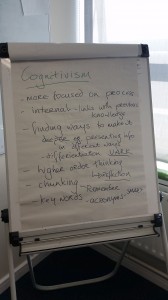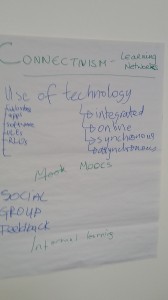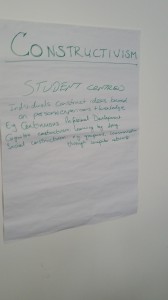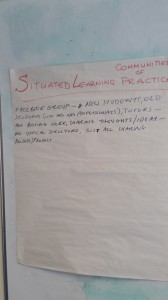The following is a reflection on Week 3 of the Learning Theories module using Gibbs Reflective Cycle.
Description
Today we covered Constructivism, Social Constructivism & CoPs and an added bonus was Connectivism. We were introduced to Piaget, Bruner, Vygotsky, Bandura, Freire and Wenger to name but a few.
Constructivism
Constructivism is where learners construct their own knowledge through experience and reflection. It is an active process and ‘new knowledge is adapted rather than adopted’ (Jordan, Carlile & Stack, 2008, p.56). Theorists such as Piaget, Bruner, Malcolm Knowles (adult education theory) and David Kolb (Kolb’s Experiential Learning) were discussed. We looked at Bruner’s Spiral Curriculum where learners are exposed to a wide range of knowledge over and over. This is a new concept for me but useful for teaching theory.
Social Constructivism
Social interaction enables and reinforces learning. Vygotsky and Bandura (Social Cognitive theory) were the theorists we looked at. Vygotsky’s Zone of Proximal Development differentiates what a learner can do without help and with help.
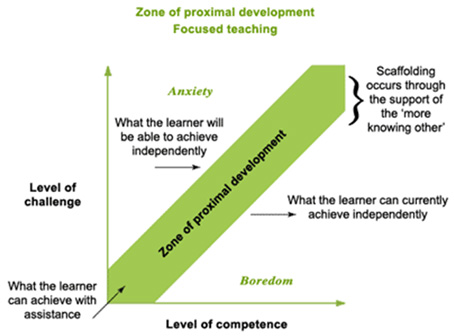
Source: http://www.education.vic.gov.au/school/teachers/teachingresources/
Communities of Practice
As noted by Wenger CoPs are ‘are formed by people who engage in a process of collective learning in a shared domain of human endeavour’ (Wenger, 2007). The following differentiates CoPs with other groups.

Source: Roisin’s notes – webcourses
Connectivism
This relatively new theory relates to the digital age and Siemens and Downes were discussed. This is a theory I must study more as it relates to technology. Here is a link to some principles of connectivism.
Feelings
I feel that Constructivism is relevant in that I would like to see myself as the facilitator with the learners taking control of their learning. I like the student centred approach in comparison to the behaviourist approach particularly when I teach adult learners who are deemed to be autonomous. From researching constructivism on the internet I came across recycling as another word to describe it. This makes sense as existing information is used over and over again. I was also familiar with Malcolm Knowles adult learning theory and David Kolb’s experiential learning cycle. This cycle is very relevant in my field of work and I relate it to a famous quote by Confucius I hear and I forget. I see and I remember. I do and I understand.
Evaluation
The class was very engaging and we were divided into groups to discuss our definitions of each of the theories. Here are contributions made by the class on the definitions.
Analysis
On reflection, social constructivism is very relevant to eLearning. For example, in an online environment the learner takes responsibility for their own learning with the tutor acting as a facilitator. For the learning to be truly successfully collaboration needs to happen which resonates with social constructivism.
So far all the theories we have discussed are relevant and is dependent on the subject matter. Furthermore, I feel that constructivism and social constructivism could improve aspects of my practice and create a more conducive learning environment.
Conclusion
Constructivism uses a learner-centered approach where learning is a process of active construction. Social constructivism promotes collaboration and includes the work of Vygotsky and Bandura. Communities of Practice relates to collective learning in communities and connectivism is a relatively new theory embracing the digital age. Overall, the most relevant theories to me are social constructivism and connectivism.
Action Plan
To study social constructivism and connectivism more and to read papers from the webcourses. The following paper looks particularly interesting
Huang, H. M. (2002). Toward constructivism for adult learners in online learning environments. British Journal of Educational Technology, 33(1), 27-37.
Jordan, A., Carlile, O., & Stack, A. (2008). Approaches to Learning . Maidenhead: Open University Press.
Siemens, G. (2004). Connectivism. A Learning Theory for the Digital Age: http://www. elearnspace. org/Articles/connectivism. htm.
References:
Wenger, E. Website: http://www.ewenger.com/theory/
